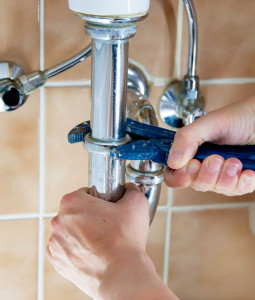 While the basic idea of plumbing is water being carried from place to place via a system of pipes, the intricacies of how a plumbing system works are often complex. A number of factors play into a plumbing system’s overall performance. Piping material, fittings, and valves, all affect how the plumbing of a home or office function. Questions frequently arise concerning plumbing problems.
While the basic idea of plumbing is water being carried from place to place via a system of pipes, the intricacies of how a plumbing system works are often complex. A number of factors play into a plumbing system’s overall performance. Piping material, fittings, and valves, all affect how the plumbing of a home or office function. Questions frequently arise concerning plumbing problems.
What Can I Put Down My Garbage Disposal?
• Always run water when using your garbage disposal, since the moisture helps break up the food, even when disposing of fat and grease. Soft or brittle debris like egg shells, cooked carrots, peas, mashed potatoes and small pieces of meat will be ground up by the disposal and flushed down the pipes, but hard materials like bones and coffee grounds will wear out the disposal and dull the blades. Fibrous materials like corn husks can jam up a disposal.
How Do I Prevent Odors in My Drains or Toilet?
• Pipes under the sink have curves in them called traps to help prevent odors from coming up from the bathroom. Odors occur when the traps dry up, so pour water down drains that emit odor to refill the trap and lock out the odor. White vinegar is also an effective deodorizer, so pouring white vinegar down any smelly drains will also kill bacteria and eliminate scent. Flush toilets regularly to help prevent odor buildup and turn on the bathroom fan when using the toilet to help ventilate the room and blow out the odor.
How long should a water heater last?
• How long a water heater lasts depends on how well it is maintained, the water quality in your area, proper installation, and amount of use. When you buy a water heater, it’s always good to look at all of the information that comes with it. That way, you will know what to expect. If you install your new water heater properly and maintain it, you can expect great results. For example, if your less expensive water heater is guaranteed to last for six years, with proper maintenance; it will probably last for eight. It’s always better to buy a good quality water heater. This is because it works twenty four hours everyday for the whole year! So when you buy a water heater that is guaranteed to last for ten years it will probably last for twelve. Considering that the average family has a forty gallon water tank and uses quite a bit of hot water, it’s worth it to get the better hot water tank and have a plumber install it. Believe it or not, even with professional installation, a great hot water tank only works out to about 32 cents a day to use. But in order for your water heater to work for longer than it should, you also need professional maintenance. This includes a yearly draining of your water heater. This gets rid of the sediment that will actually drive your energy bills higher because your water heater has to work harder to heat water. When your water heater has to work harder because of sediment, it won’t last as long as it should. So whether you have just purchased a new home or want to sell your home, it is always a good idea to drain the hot water heater and make sure that it properly maintained. This process will add value to your home and also make sure that you have hot water for your shower, your dishes, and your laundry every day. Do I need to drain my water heater? Yes, it is important to drain you water heater once every year. If you are a homeowner, it is one more chore that you have to do, but it will make your water heater last a lot longer. This is because draining your water heater cleans out the sediment that collects in the bottom of the tank and also makes your water heater run more efficiently. All water heater manufacturers recommend that you flush the sediment from your water heater at least once a year. This can be done by one of our plumbers, and the cost of the visit pays off in the long run. As well, this is not a job you want to do on your own. There is not only a chance of scalding, but there is also a big mess to clean up if you don’t run the hoses right. Many homeowners don’t understand what sediment is. Sediment is actually sand or grit that has gotten into the local water supply system. The water pipes in the area can be extremely old, depending on where you live. Some pipes that transport water date back to the 1940’s and simply have never been replaced. This means that sediment from these pipes come into your home every time that you use water. How often that you need to drain your water heater also depends on where you live. The quality of your water may have much more of an impact on your water heater than you might think. Besides having old pipes in your neighborhood, if you have water with a high mineral content, then you may have to flush the sediment from your water heater more often than other homeowners. Call on our plumbing service or the local water authority for more information.
My water heater makes gurgling sounds?
•If you own a home and you have never checked out your water heater, you may be in for a big surprise. Water heaters usually start gurgling because they have had problems that have been going on for quite some time. Water heaters are appliances that seem like they are maintenance free, just like refrigerators, but things aren’t always as they seem. A gurgling sound from your water heater may only last only 3-4 seconds, but be aware that if other appliances set off the gurgling affect from your hot water tank, you may have bigger problems. The gurgling effect from your hot water heater may start when you try to run a few appliances at the same time. A good example is when you try to run the dishwasher, the washing machine, and the shower all at the same time. There are all kinds of self-help fix it web sites, but you really need a professional plumber if your water heater is gurgling. Problems with a water heater start with sediment, which builds up at the bottom of the tank, which may also cause the water in the tank to boil when you don’t expect it. This is not something that you want have happen. When you have a water heater, you want the temperature to remain consistent. This is for several reasons. First, it is important to save energy, but more importantly you do not want to get scalded when you are in the shower. Generally speaking, if you own a home and have never looked at the water heater, you may get a break and fix it by having the tank drained. While a tank draining may save your water heater, you may want to look at buying a new one. You can drain the water heater yourself, but you probably won’t see any results that will help you. A new water heater will save you on energy costs, can get you a tax break, and even improve the value of your home.
What is PEX?
•PEX is the biggest revolution in plumbing since the flush toilet. PEX is faster to install than copper. If you use a manifold and “home-run” system (shown below), it’s like running a garden hose to each fixture—super fast and easy. But even if you install PEX in a conventional main line and branch system, the connections are quicker to make than soldering copper. PEX won’t corrode like copper. If you live in an area with acidic water, copper can corrode over time. PEX is unaffected by acidic water and is therefore a better choice in these areas
Is PEX reliable?
•PEX has been used for decades in other countries, where there are thousands of homes with 30-year-old, leak-free PEX. Most of the problems with PEX systems (in the United States and elsewhere) have been caused by sloppy installation or faulty fittings rather than the tubing itself.
Will PEX break or split if it freezes?
•Probably not. Manufacturers are reluctant to say so, but reports from the field suggest PEX can withstand freezing. You should still protect the tubing from freezing, but since it can expand and contract, it’s less likely to break than rigid piping
Why should I install copper piping?
•Copper piping does not rust like galvanized iron piping and will provide safe clean water for years to come. The life expectancy of copper is the same as the building- meaning install it once and forget about it.
